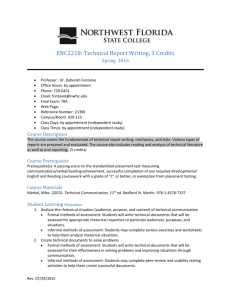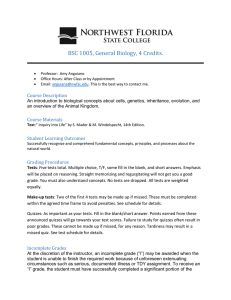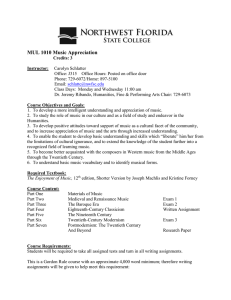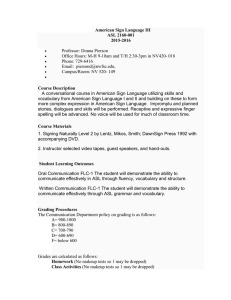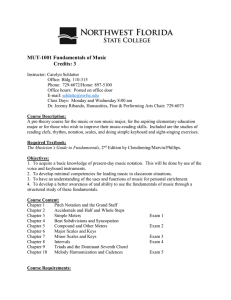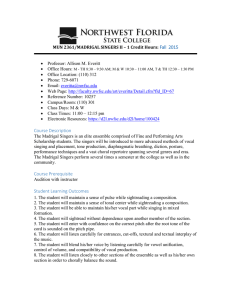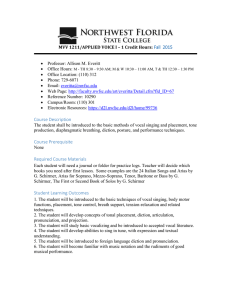Introduction to Creative Writing I & II CRW-2001 & 2002 Spring 2016
advertisement
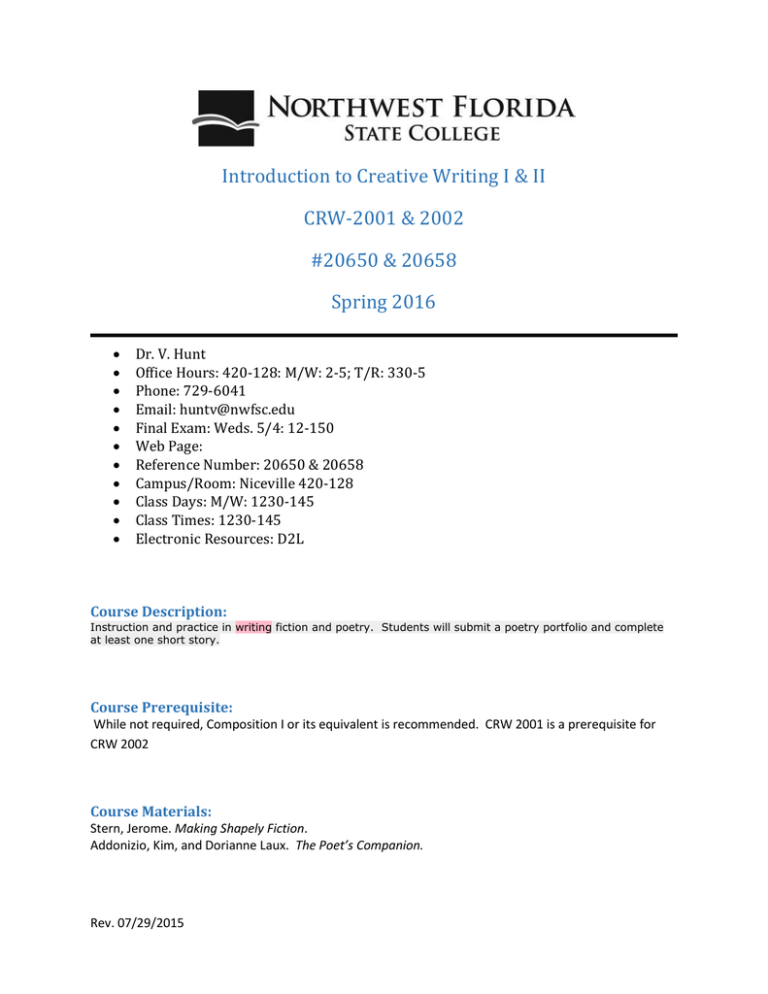
Introduction to Creative Writing I & II CRW-2001 & 2002 #20650 & 20658 Spring 2016 Dr. V. Hunt Office Hours: 420-128: M/W: 2-5; T/R: 330-5 Phone: 729-6041 Email: huntv@nwfsc.edu Final Exam: Weds. 5/4: 12-150 Web Page: Reference Number: 20650 & 20658 Campus/Room: Niceville 420-128 Class Days: M/W: 1230-145 Class Times: 1230-145 Electronic Resources: D2L Course Description: Instruction and practice in writing fiction and poetry. Students will submit a poetry portfolio and complete at least one short story. Course Prerequisite: While not required, Composition I or its equivalent is recommended. CRW 2001 is a prerequisite for CRW 2002 Course Materials: Stern, Jerome. Making Shapely Fiction. Addonizio, Kim, and Dorianne Laux. The Poet’s Companion. Rev. 07/29/2015 Grading Procedures: 5 poems (2 revised) 15% 1 short-short story 15% 1 full-length story 15% Video/audio poems 10% Peer Critiques 45% Grading Criteria: Poems and Short Stories (45%): I do not grade submissions for quality; instead, I grade according to effort. Most classes reflect a broad spectrum of abilities and experience. What I like in a piece might be quite different than what another enjoys; after all, art is diverse and our opinions are varied. Give each submission your best, submit it on time, and do what you can to meet the techniques we’ll be studying, and your grade for this area will be fine. (1): Submissions must be posted by due date for full credit. Late work will be penalized. (2): Work should be correctly formatted (short stories are double-spaced, include page numbers, and saved as RTF file) and concisely edited. While this isn’t Comp I, and I won’t be marking every incorrect comma, it is a college-level English course, and I do expect you to proofread and polish your work before submitting it for the class to read. (3): All work attempts to meet the conventions and guidelines prescribed in the writing prompt. While we may not always succeed in everything we try, this class is about trying anyway. Peer Critiques (45%): Response Guidelines are available under Content on D2L. As you can see, responses garner the most weight in my grading scale. In my experience, students who carefully read the submissions and articulate thoughtful responses will, in the process, learn a lot about creative writing. Rev. 07/29/2015 It is important to recognize that reading and responding to the work of classmates will constitute the bulk of our work in CRW 2001. And I warn you up front that it is a time consuming activity. Even if you are a very fast reader (I most definitely am not), done correctly, it will take time to compose your responses. When responding to the work of your peers, be courteous. This does not mean you must give only glowing responses to a classmate’s work. If the piece has flaws, point them out, but do so with tact and specificity. In other words, “This poem sucked,” or “This story was boring,” are inappropriate. Instead, begin your critique by finding something positive; then be specific about other problems: “The image of the gorilla sitting on the clock tower on page four was very visual and concrete; however, it was hard to understand how it contributed to the rest of the story, which seemed to be about an anorexic widow.” Just as you would never say, “Ohhh, that sure is an ugly baby” to a new mother, keep in mind that these stories are the creations of budding artists. Yes, some may need to develop and grow, some may need to mature, but be delicate even while being honest. (1): Initial responses must be posted to the Discussion board by the due date; late responses will be penalized. While I welcome, and even encourage, dialogue with one another, your initial response, the one that was entirely shaped by your own close-reading, must meet the criteria set forth in my Response Guidelines. After that, feel free to respond in any (polite) manner. (2): Responses should be at least one strong paragraph—not one or two quick sentences. If you are following the prompts on the Response Guidelines, your responses should easily meet or exceed this requirement. Peer Responses must meet the basic conventions of English grammar and syntax. Again, I’m not marking commas here, but no one should have to decipher your comments. All submissions should be posted as RTF files and include page numbers. Documents should be doublespaced. Put the title at the top of the page and also in the heading line. Make-up Work: Late submissions will be penalized. Incomplete Grades: At the discretion of the instructor, an incomplete grade (“I”) may be awarded when the student is unable to finish the required work because of unforeseen extenuating circumstances such as illness or TDY assignment. To receive an “I” grade, the student must have successfully completed a significant portion of the required coursework and be able to Rev. 07/29/2015 finish the remaining work without attending class. An “I” grade will automatically convert to a grade of “F” if the student does not complete the remainder of the coursework by the established deadline. FA Grades: Both the F and FA are failing grades, are calculated as such in the student’s GPA, and show up on the student’s transcript. A student’s GPA and his or her time-to-degree are both factors in qualifying for future aid as outlined in the College’s Standards of Satisfactory Academic Progress: (http://catalog.nwfsc.edu/content.php?catoid=9&navoid=1489#Return_of_Title_IV_Financ ial_Aid_Funds ). Classroom Conduct: When responding to the work of your peers, be courteous. This does not mean you must give only glowing responses to a classmate’s work. If the piece has flaws, point them out, but do so with tact and specificity. In other words, “This poem sucked,” or “This story was boring,” are inappropriate. Instead, begin your critique by finding something positive; then be specific about other problems: “The image of the gorilla sitting on the clock tower on page four was very visual and concrete; however, it was hard to understand how it contributed to the rest of the story, which seemed to be about an anorexic widow.” Just as you would never say, “Ohhh, that sure is an ugly baby” to a new mother, keep in mind that these stories are the creations of budding artists. Yes, some may need to develop and grow, some may need to mature, but be delicate even while being honest. Class Attendance Students who stop attending class or are not able to pass the course due to attendance expectations stated in the syllabus may receive a failing grade of “FA.” An “FA” grade is a failing grade in GPA calculations and may impact the receipt of federal aid in subsequent courses. Students traveling for college approved activities will not be penalized academically but will be responsible for missed work. Videos – This course employs lecture capture software to provide you with videos of your instructor’s lectures/PowerPoints/notes/demonstrations, etc., and you are required to watch these. These videos can be viewed with a standard Internet connection. If your home Internet connection is not adequate, please remember that any NWFSC open lab is available to you. You need only take your own headphones with you. Rev. 07/29/2015 Cell Phone/Electronic Devices Cell phones, pagers, and other such electronic devices must not distract from learning. Courtesy to the professor and other students requires that phones be on vibrate or silent mode during class. No student should initiate conversations, including texts, during class activities. Use of electronic communication devices during examinations or other graded activities may constitute grounds for disciplinary action; such devices must be completely out of sight during exams or other assessments. Where emergency or employment situations require access to electronic communication services, arrangements may be made in advance with the instructor. Emergency College Closure In the event of unusual or extraordinary circumstances, the schedule, requirements, and procedures in this course are subject to change. If the college closes for inclement weather or other emergency, any exams, presentations, or assignments previously scheduled during the closure period will automatically be rescheduled for the first regular class meeting held once the college re-opens. If changes to graded activities are required, students will not be penalized as a result of the adjustments, but will be responsible for meeting revised deadlines and course requirements. Children in the Classroom As a courtesy to other students and the learning process, students may not bring children with them to class sessions. Health and safety concerns prohibit children from accompanying adult students in any lab, shop, office, or classroom or other college facility where potential hazards exist. If a child-related emergency means you must miss class, contact the instructor as soon as possible to determine your options. (The full “Children on Campus” policy statement appears in the College Catalog.) Student Rights, Responsibilities, and Academic Integrity Students are responsible for adherence to all college policies and procedures, including those related to academic freedom, cheating, classroom conduct, computer/network/email use and other items included in the Northwest Florida State College Catalog and Student Handbook. Students should be familiar with the rights and responsibilities detailed in the current Northwest Florida State College Catalog and Student Handbook. Plagiarism, cheating, or any other form of academic dishonesty is a serious breach of student responsibilities and may trigger consequences which range from a failing grade to formal disciplinary action. RESOURCES The Academic Success Center (ASC) is located in the Activities Center (Building 410) on the Niceville Campus. The ASC provides free learning support services such as tutoring, ESOL, and writing assistance for all NWFSC students. Individual and group tutoring is Rev. 07/29/2015 available in a wide range of subjects on a walk-in-basis and by appointment. For more information, call the Academic Success Center at (850) 729-5389 or visit our website at Free Tutoring. Reading to Learn (R2L) is a project of Northwest Florida State College designed to support students’ learning through direct instruction of reading strategies. Students may access R2L at our website: Reading to Learn. Math Labs are located in the Math Building L, Room L-131, on the Niceville Campus and in Building 7, Room 702 on the Fort Walton Beach Campus and Room 131 at the Crestview Center. The math labs are open to all students and provide free walk-in tutoring for all mathematics courses. For lab hours, students may call the Math Department at (850) 7295377 or visit our website at Math Lab. Smarthinking is an online, real-time tutoring offered free to students, who may access this service via RaiderNet. Open Computer Labs There are numerous open computer labs throughout the Northwest Florida State College campuses. Students may access our website for lab locations and hours: Computer lab location and hours Testing Center Testing Centers administer college admissions tests, placement tests, proctored exams, ACT/SAT, GED. CLEP, and DSST (formerly known as DANTES). General information concerning tests, hours Testing Center hours may be accessed on the Testing Center website at Testing Center. Makeup exams may be taken in the Testing Center, depending upon instructor policies on late work. Library, Online Reference Materials, and Resources The library is a comprehensive, learning resource center providing information in print, digital, and multimedia formats to support the educational objectives of the College. In addition to in-house materials, online services and resources can be accessed through the LRC website. Library hours are posted each semester at the building entrance and on the LRC website at Learning Resource Center Assistance for Military and Veterans Northwest Florida State College supports our military and veterans students. You may contact NWFSC Eglin AFB Education Services Building at 850-200-4180 or NWFSC Hurlburt Center Educational Services Building at 850-200-4190 or visit our website: Support Our Military Students with Disabilities Rev. 07/29/2015 Northwest Florida State College supports an inclusive learning environment for all students. If you have disabilities for which accommodations may be appropriate to assist you in this class, please contact the Office of Disability Support Services, located in the Activities Center (Building 410) on the Niceville Campus, or call 850-729-6079 (TDD 1800-955-8771 or Voice 1-800-955-8770). You may also visit our website: Disability Support Services. Rev. 07/29/2015
